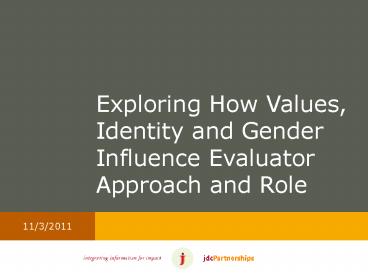Exploring How Values, Identity and Gender Influence Evaluator Approach and Role - PowerPoint PPT Presentation
1 / 11
Title:
Exploring How Values, Identity and Gender Influence Evaluator Approach and Role
Description:
Exploring How Values, Identity and Gender Influence Evaluator Approach and Role * * AEA Values Systematic Inquiry Competence Integrity/ Honesty conduct systematic ... – PowerPoint PPT presentation
Number of Views:215
Avg rating:3.0/5.0
Title: Exploring How Values, Identity and Gender Influence Evaluator Approach and Role
1
Exploring How Values, Identity and Gender
Influence Evaluator Approach and Role
2
AEA Values
- Systematic Inquiry
- Competence
- Integrity/ Honesty
- conduct systematic, data-based inquiries about
whatever is being evaluated. - provide competent performance to stakeholders.
- ensure the honesty and integrity of the entire
evaluation process.
3
AEA Values
- respect the security, dignity and self-worth of
the respondents, program participants, clients,
and other stakeholders with whom they interact. - articulate and take into account the diversity of
interests and values that may be related to the
general and public welfare.
- Respect for People
- Responsibilities for General and Public Welfare
4
AEA Cultural Competency Statement
- Culture is central to economic, political, and
social systems as well as individual identity.
Thus, all evaluation reflects culturally
influenced norms, values, and ways of
knowingmaking cultural competence integral to
ethical, high-quality evaluation.
5
AEA Cultural Competency Statement
- 2. Given the diversity of cultures within the
United States, cultural competence is fluid. An
evaluator who is well prepared to work with a
particular community is not necessarily competent
in another.
6
AEA Cultural Competency Statement
- 3. Cultural competence in evaluation requires
that evaluators maintain a high degree of
self-awareness and self-examination to better
understand how their own backgrounds and other
life experiences serve as assets or limitations
in the conduct of an evaluation.
7
AEA Cultural Competency Statement
- 4. Culture has implications for all phases of
evaluationincluding staffing, development, and
implementation of evaluation efforts as well as
communicating and using evaluation results
8
jdcP Values
- Our clients engage in important work of creating
positive social change our role is to contribute
to their continued success. - Our clients are our partners in our work
together. - A healthy and strong organization is one that
values its staff and partners. - Values, assumptions and decision-making processes
must be clearly articulated to team members. - Transparency supports meaningful communication
it builds collaboration and momentum in support
of the mission.
9
Individual Reflection
- How does it affect my professional interactions
and endeavors? - Are their stereotypes or external perceptions
that influence my work? - What are your professional aspirations?
10
A
Group Discussion
- Implications for practice?
- When values are aligned, what do you notice?
- When they are not aligned, how do you address?
11
Moving Forward































